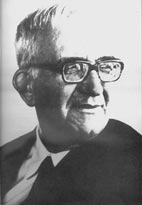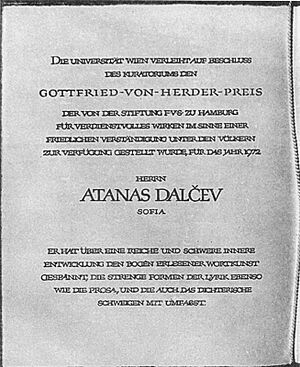Atanas Dalchev facts for kids
Quick facts for kids
Atanas Dalchev
|
|
|---|---|
 |
|
| Native name |
Атанас Далчев
|
| Born | June 12, 1904 Thessaloniki, Salonica Vilayet, Ottoman Empire |
| Died | January 17, 1978 (aged 73) Sofia, People's Republic of Bulgaria |
| Occupation | Poet, critic, translator |
Atanas Hristov Dalchev (also spelled Dalčev; Bulgarian: Атанас Далчев) was a well-known Bulgarian poet, critic, and translator. He was born on June 12, 1904, and died on January 17, 1978. Dalchev was one of the most important Bulgarian poets in the 1920s and 1930s.
He also translated many books and poems. He worked with texts from French, Spanish, English, German, and Russian writers. Atanas Dalchev received the Herder Prize in 1972 for all his literary work. He also got the Znak Pocheta Order in 1967 for sharing Russian culture in Bulgaria.
Contents
Early Life and Education
Atanas Dalchev was born in Thessaloniki. His father, Hristo Dalchev, was a lawyer. He was also a Member of Parliament (MP) for Macedonian Bulgarians in the Ottoman parliament.
In 1913, after the Balkan Wars, his family moved to Sofia. Atanas finished high school in Sofia in 1922. He later studied Pedagogics and Philosophy at Sofia University. He graduated in 1927.
His Poetry and Challenges
In 1926, Dalchev published his first book of poems. It was called Prozorets, which means Window. After that, he released three more poetry collections. These came out in 1928, 1930, and 1943.
After 1945, Dalchev faced some difficulties. His writing style was criticized by the new government in Bulgaria. This led to a time when he wrote very few poems. He started writing more again after 1956. In his later years, Dalchev wrote about 25 new poems. His new works were added to his older poetry books.
Literary Style and Influence
Atanas Dalchev joined the Bulgarian literary scene in the 1920s. He was part of a group called Strelets (Saggitarius). This group wanted Bulgarian culture to be more like modern European art.
Dalchev's poems and critical articles showed he did not like the symbolist style of writing. His works focused on real feelings and clear pictures. He explored the limits of the physical world. Because of this, people often called him a metaphysician in the concrete. This means he found deep meaning in everyday, real things.
Fragments and Lasting Legacy
In 1967, Dalchev published a small book called Fragmenti. This means Fragments. The book contained short sayings, thoughts, and ideas. These had first appeared in different magazines. Fragments made him known as a great writer of aphorisms.
Even though he didn't write a huge number of original works, Dalchev was very important. He was known for his independent thinking. He is considered one of the most respected figures in Bulgarian culture of the 20th century. Many people read and enjoy his poems. He is seen as a leading classic Bulgarian author who stayed true to his own style.
Atanas Dalchev passed away in Sofia in 1978. In 1984, a publishing house released his collected Works in Two Volumes. This collection included his poetry, critical writings, aphorisms, and translations.
Dalchev's poems and selected aphorisms have been translated into many languages. These include French, Russian, Polish, Czech, Slovak, Hungarian, German, Italian, Spanish, English, Turkish, Chinese, Japanese, Arabic, and Swedish. His works have appeared in magazines and literary collections around the world.
 | Emma Amos |
 | Edward Mitchell Bannister |
 | Larry D. Alexander |
 | Ernie Barnes |


